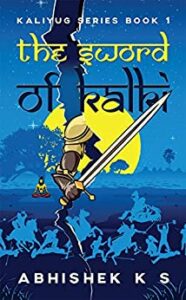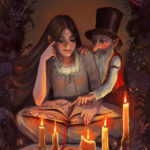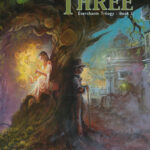I received this book for an honest review. All expressed opinions, cynical or otherwise, are my own.
Do you remember the last time you had a meal, that, whether it was too salty, sweet, or a combination that started off tasting wonderful, but where your appreciation of it changed at the end? Maybe you even considered this might end up among one of your favorite foods. The thing is, halfway through you are already getting tired of the overbearing flavor. And by the end, you’ve forgotten what drew you to it in the first place. The Sword of Kalki is a bit like that, in the sense that a more lenient application of some of the aspects that I initially found quite alluring, would have served it better in the long run.

 Rey, a cooky teen has been dragged into a colossal battle between good and even by a girl who is more his frenemy than anything else. You see he is what’s called a “descendant,” because one of his ancestors got romantically entangled with a Deva (not Diva, as in Mariah Carey, which would be worse), but the divine beings based on Indian culture. What follows is an 80’s style training montage, and a battle-royale for the leadership of this group.
Rey, a cooky teen has been dragged into a colossal battle between good and even by a girl who is more his frenemy than anything else. You see he is what’s called a “descendant,” because one of his ancestors got romantically entangled with a Deva (not Diva, as in Mariah Carey, which would be worse), but the divine beings based on Indian culture. What follows is an 80’s style training montage, and a battle-royale for the leadership of this group.
My view of the beginning of the book is far and away different from the latter half. At first, the fourth wall breaking and self-deprecating humor is rather fresh, and charming. The dialogue is clever, and the pacing fluid. I generally wanted to read on and found myself blazing through the first thirty percent of the book. There is also a pervasive sort of energy K.S. Abhishek exudes in his writing that is infectious. Unfortunately, it degrades from there.
The humor gets to be too much. Like icing, on top of icing on top of icing, where somewhere below all of it, there might be a hint of a cake. Reyash is hard to root for at this point. He borders on a welcome mat, and the dialogue between him and the other characters is stilted, and uninteresting. Better characterization of the supporting cast would have also helped differentiate them from one another. Lastly the great battle, or “Pranayaka Spardha” that dominates the last third of the novel, is hard to follow, and uninteresting.
My advice to the author: don’t overdue the bits that make your book unique. Use it sparingly and ground your fight scenes in the setting. Also, chew into your characters, beyond the surface. Still, all this having been said, there is a decent novel hidden underneath all the icing. Abshishek exudes enthusiasm, and when he is at his best, his writing can be charming. Maybe after a few revisions, we can all enjoy the cake.



Leave a Reply